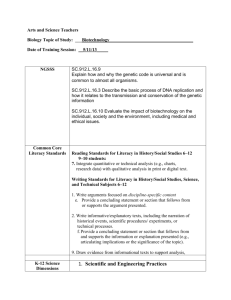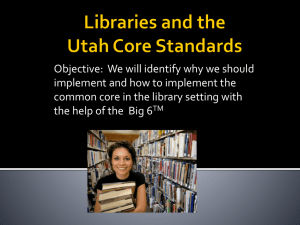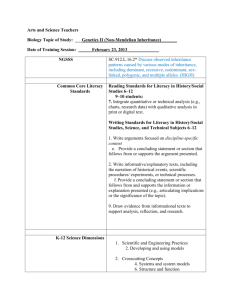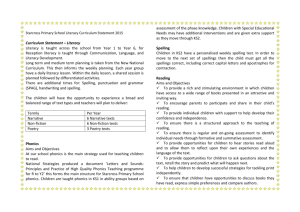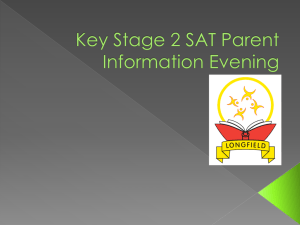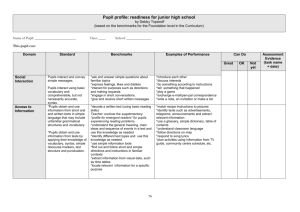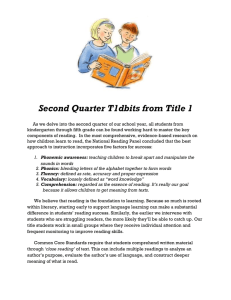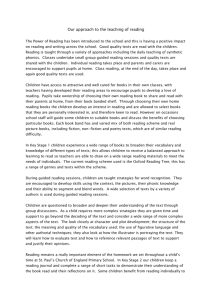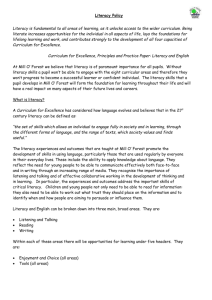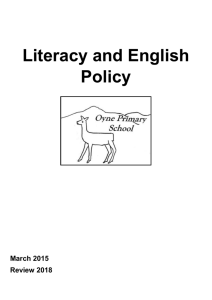Literacy Policy
advertisement
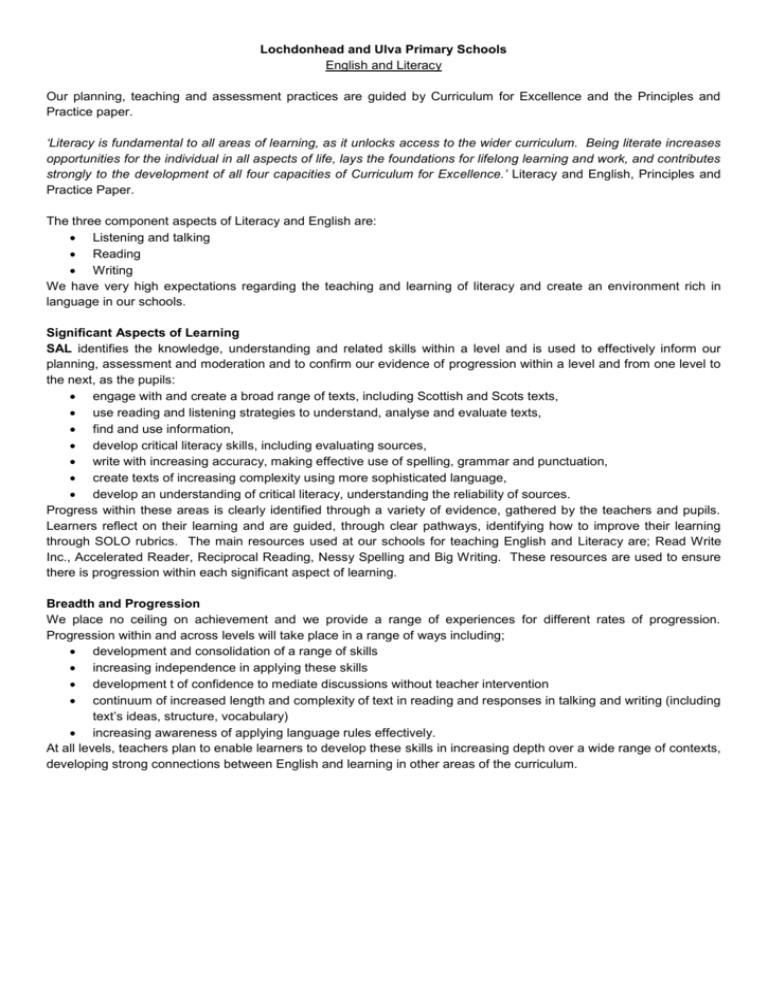
Lochdonhead and Ulva Primary Schools English and Literacy Our planning, teaching and assessment practices are guided by Curriculum for Excellence and the Principles and Practice paper. ‘Literacy is fundamental to all areas of learning, as it unlocks access to the wider curriculum. Being literate increases opportunities for the individual in all aspects of life, lays the foundations for lifelong learning and work, and contributes strongly to the development of all four capacities of Curriculum for Excellence.’ Literacy and English, Principles and Practice Paper. The three component aspects of Literacy and English are: Listening and talking Reading Writing We have very high expectations regarding the teaching and learning of literacy and create an environment rich in language in our schools. Significant Aspects of Learning SAL identifies the knowledge, understanding and related skills within a level and is used to effectively inform our planning, assessment and moderation and to confirm our evidence of progression within a level and from one level to the next, as the pupils: engage with and create a broad range of texts, including Scottish and Scots texts, use reading and listening strategies to understand, analyse and evaluate texts, find and use information, develop critical literacy skills, including evaluating sources, write with increasing accuracy, making effective use of spelling, grammar and punctuation, create texts of increasing complexity using more sophisticated language, develop an understanding of critical literacy, understanding the reliability of sources. Progress within these areas is clearly identified through a variety of evidence, gathered by the teachers and pupils. Learners reflect on their learning and are guided, through clear pathways, identifying how to improve their learning through SOLO rubrics. The main resources used at our schools for teaching English and Literacy are; Read Write Inc., Accelerated Reader, Reciprocal Reading, Nessy Spelling and Big Writing. These resources are used to ensure there is progression within each significant aspect of learning. Breadth and Progression We place no ceiling on achievement and we provide a range of experiences for different rates of progression. Progression within and across levels will take place in a range of ways including; development and consolidation of a range of skills increasing independence in applying these skills development t of confidence to mediate discussions without teacher intervention continuum of increased length and complexity of text in reading and responses in talking and writing (including text’s ideas, structure, vocabulary) increasing awareness of applying language rules effectively. At all levels, teachers plan to enable learners to develop these skills in increasing depth over a wide range of contexts, developing strong connections between English and learning in other areas of the curriculum. Application We use a skilful mix of appropriate approaches in our learning and teaching, including; using relevant contexts, building on pupils’ experiences, effective and interactive teaching, careful balance of spontaneous play and planned activities, harnessing motivation through responsive planning, using of a wide variety of different types of text and media, including Scots and Scottish texts, collaborative working and independent thinking and learning, making meaningful links across the curriculum, developing problem solving skills, appropriate and effective use of ICT. Challenge Our pupils apply their learning in new and unfamiliar contexts This includes interdisciplinary work, learning through the life and ethos of the school and personal achievements in and out of school. We provide planned opportunities to apply literacy skills across curricular areas in real and meaningful contexts. Applying learning involves communicating to wider audiences, both across the curriculum and beyond the place of learning. Staff actively promote the development of skills and ensure they are embedded in planning for learning, teaching and assessment. Assessment Our assessment approaches show the pupils their progress within Literacy and English and they are given the opportunities to demonstrate their achievements in a range of ways. We build on the principles of Assessment is for Leanring. In applying their learning our pupils are given the opportunity to achieve across a breadth of experiences. Our pupils achieve breadth in their learning by – communicating and collaborating across learning, in listening, talking, reading and writing engaging with and creating a broad range of texts, fiction and non-fiction, printed and multi-media, spoken and written, including Scottish texts extending and enriching their use of vocabulary, including Scots exploring, discussing and using a wide variety of word patterns and text structures developing critical literacy in a wide range of contexts Evidence will be gathered in a range of ways including, day to day learning, obervations and discussions around a pupils’ engagement and enthusiasm with texts and specific assessment tasks. Some questions we use for assessment are; How well is this pupil communicating with confidence to suit purpose and audience and are they showing increasing awareness of others in their interactions? How does this pupil’s confidence in listening and talking help their personal development, social skills and ability to solve problems? To what extent is this pupil exploring and enjoying fiction and non-fiction texts of increasing depth, complexity and variety and are they making increasingly sophisticated personal responses? How well does this pupil engage with challenging issues raised in text? To make a holistic judgement of learners’ achievements, a collection of evidence on more than one occasion and in different contexts is required. We moderate pupils’ work in a variety of ways, through discussion within and across both schools and sharing examples between both schools.

